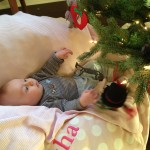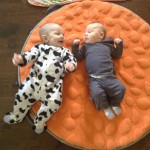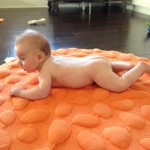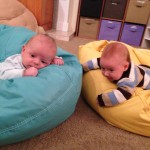Continuing with the play theme, your 2 to 4 month old baby is definitely more alert, more interactive, and more interested in initiating exploring his world. You just need to give yourself permission to linger, to observe and to marvel. It will still take a while for him to organize purposeful movements, sounds, smiles, and coos, but if you linger it will happen. And then you will be addicted and do everything in your power to see him do it again!
A 2 to 3 month baby smiles and coos, holds his head more steadily in midline, and controls gross shoulder movements to reach his arm in space towards something interesting. His favorite toy is still YOU, but you can also introduce bold colored or simply patterned books or toys (or safe Christmas ornaments). His gross reach into space will be more like a punch with a closed fist (no controlled grasp with hand yet), but when his hands are closer to his body and face or on an object, they will open and scratch at the surfaces.
I caught my husband playing with Kellan on the changing table, giving and receiving “body blows” with right and left jabs and hooks. I LOVED seeing this because Neil entered Kellan’s world. He observed what Kellan was doing and gave meaning to it. Kellan’s blows knocked Neil a few paces backwards or to the side, and with every repetition, Kellan understood more and more that his movements were affecting his environment. He was in control! Smiles and coos followed. No laughs yet, but we are waiting to hear Kellan’s first giggle!
A 3 to 4 month baby definitely exhibits more control, keeping body symmetrical right and left, top to bottom. Reaching is more refined and, when body is supported, head control is great with very little wobbling! This all translates into more refined play. Baby will turn his head to your voice, follow you with his eyes, reach for and briefly grasp objects. Expect more cooing and smiling. And his favorite toy…..YOU! Faces fascinate baby, but if you need to step away, try placing baby near a mirror so he can see himself!
Babies at this time are busy exploring all that they see. Because head control is greatly improved, eyes have the opportunity to fix themselves on different objects to study them. You will find baby staring at you and if in the right position, different parts of his own body (which he considers to be completely separate from himself). Though he can’t yet do it by himself, if you bring his feet into view, he will study them like they are the most amazing phenomena ever. This often elicits gross reaching and swiping at them. Self-discovery is so important, and this age is a perfect one to start “naked playtime.” Take his clothes and diaper off and in a warm room on a blanket or floor mat, place him on back, tummy and side and let him move around and explore in the buff. He will get his hand-to-hand, hand-to-chest, hand-to-face/head/mouth. If your house is just too cold, linger a little longer in the bathtub for the same experience.





Other ideas include music and singing, starting peer time in playgroups (babies LOVE other babies…and it’s a great time for moms/dads to get together), reading (never to early for this), and lingering with the daily tasks. Your play will come naturally if you really observe your baby, enter his world and help him make sense of it. Be respectful of his needs and follow his cues, whether he wants more intense sensory experiences or to calm down a bit. Sometimes it can be a challenge to read your baby and know what they need, but through daily play and interaction, you will continue to know your little guy and love him that much more!
What are some of your favorite play activities at this age?
